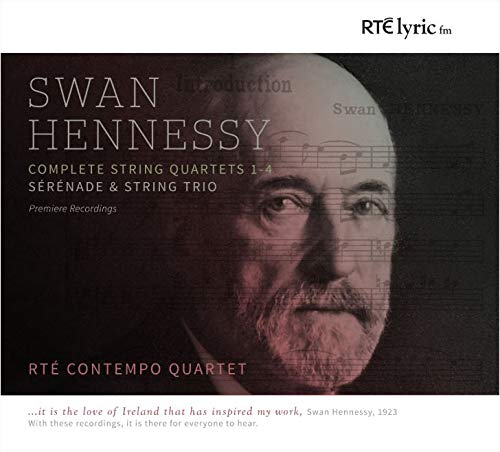
ESSENTIAL RECORDINGS

String Quartet No. 1, Op. 46
String Quartet No. 2, Op. 49
String Quartet No. 3, Op. 61
String Quartet No. 4, Op. 75
Serenade, Op. 65
Petit trio celtique, Op. 52
Not unlike Antonin Dvorak's integration of Czech or Bohemian folk elements within his chamber music which made it readily charming and accessible, the chamber music of Irish-American composer Swan Hennessy (1866-1929) has the same effect as it incorporates many Irish and Celtic stylistic elements, sometimes subtle and sometimes blatant. But wait ... I'm sure you're wondering who is this Swan Hennessy. The booklet notes state that "he must rank as one of the most unknown among the unknown composers of the early 20th century." Although that's debatable since over the last few years I've stumbled upon many new recordings of composers from the same era that have been rescued from the jaws of oblivion.
Born in Rockford, Illinois, his father was from Ireland. Throughout his life he lived in Germany, Switzerland, Italy, England, and finally settled in France. The fact that he never got to establish a strong foothold in any of those countries may have played a role in his relative obscurity. His first name is really Edward, but as a child everyone called him 'Swan' based on his mother's surname. That much travel and exposure to many different styles of music burgeoning at the turn of the century may have given Hennessy the sense that he was an outsider with no identity of his own, until he settled on writing chamber music focused on upholding his Irish background. Another brick-in-the-wall which sealed him off from the rest of musical society at the time, was his old-school approach to composition, as well as his publicly open criticism of avant-garde music and composers like Arnold Schoenberg.
Personally, and notwithstanding the fact that a hundred years have passed since then, I would much rather listen to a Dvorak quartet rather than a Schoenberg quartet any day which, by extension, based on what I said earlier means listening to a Hennessy quartet. The writing is always fluid, structurally solid, and well balanced between the four individual players. Even within the String Quartet No. 4, where the tonality is less obvious, the listener never feels left behind by a composer overly engrossed in his own experimental concepts. As a matter of fact, some passages are still downright traditional in style. The RTE Contempo Quartet, Bogdan Sofei (violin), Ingrid Nicola (violin), Andreea Banciu (viola) and Adrian Mantu (cello) are strong exponents of contemporary Irish music but also regularly present complete Beethoven cycles, as well as chamber works by Haydn, Schubert, Schumann and Brahms. In this recording their understanding and care for the music of Swan Hennessy is constantly obvious, and their lyrical phrasing brings out this music's outwardly sunny disposition.
These are world premiere recordings, so if you're a chamber music enthusiast, this is something new worth listening to.
Jean-Yves Duperron - April 2019